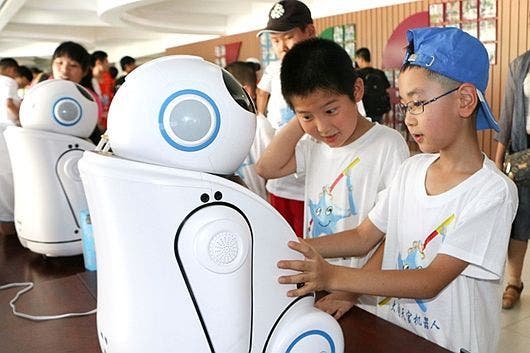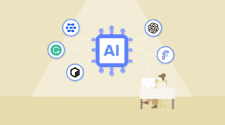Artificial Intelligence (AI) is no longer a futuristic concept. It is already a part of our daily lives, and its impact on society is growing rapidly. Recognizing this, many countries are now introducing AI courses into their primary and secondary school curriculums. After China, South Korea is now adding this topic to primary and secondary school curricula. According to China Daily, AI courses for primary and secondary schools will be compulsory in the Zhejiang province in China.

This move is part of China’s broader push to become a world leader in AI by 2030. The courses will cover topics such as machine learning, computer vision, and natural language processing. The goal is to equip students with the skills they need to thrive in a world where AI is becoming increasingly prevalent.
In addition, according to “Asia Daily”, the Ministry of Education of South Korea recently announced that in order to meet the growing demand for diversified learning content for teachers and students, AI books will be introduced in 2025. These books will be used in the Korean elementary and middle school classes.
South Korea has a long term plan for AI
The report from Asia Daily claims that from the spring of 2025, there will be AI books in the Korean language. These books will be used by students in the third and fourth grades of Korean elementary schools. Students in the first grades of junior high school will also use these books. They will use these books for subjects like maths, English, and IT classes. At the same time, the Korean Ministry of Education plans to expand the applied subjects and grades every year. The Asian nation plans to achieve full coverage by 2028.
South Korea’s Deputy Prime Minister for Social Affairs and Minister of Education, Li Zhouhao stated in the “AI Digital Textbook Promotion Plan” that AI digital books will apply to the revised education scheme books in 2022. It will then slowly expand the involved grades in stages. Elementary school students in first and second grade are very young. Thus, the govt will not include them in the project for the time being.
The Korean Ministry of Education says that it plans to expand AI courses to subjects such as society, science, family economics, and science and tech in 2026. It will also include history courses in 2027. There will be full implementation of AI courses in sports, music, and art in 2028.

Gizchina News of the week
The Ministry of Education of South Korea stated that AI digital books can observe students’ comprehensive learning level in real time and carry out “targeted teaching”. AI can also analyze students’ acceptance and growth rates. Also, it can provide basic courses for students with weak learning abilities.
The South Korean govt is vigorously promoting local brands to improve their competitiveness in the AI field. Also, OpenAI CEO Sam Altman just visited South Korea last Friday and met with South Korean President Yin Xiyue.
The Need for AI Education
The introduction of AI into primary and secondary school curriculums is driven by several factors. First, AI is already changing many industries. It is expected to have a huge impact on the job market in the coming years. By introducing AI courses early on, students will be better prepared for the jobs of the future.
Second, AI has the potential to improve the quality of education. For example, AI – powered tutoring systems can provide personalized learning experiences that adapt to each student’s needs and abilities. This can help students learn more effectively and efficiently.
Finally, AI education can help students become more responsible digital citizens. They will learn about the ethical implications of AI. This includes bias and privacy concerns, and how to use AI in a decent and ethical manner.
Issues of AI Education
Introducing AI into primary and secondary school curriculums is not without its issues. One of the biggest issues is the lack of qualified tutors. AI is a complex and rapidly evolving field, and many teachers may not have the needed skills and knowledge to teach it. To address this, some countries are investing in teacher training programs. This is to ensure that teachers get the skills they need to teach AI very well.
Another issue is the lack of suitable learning materials. According to OECD, very few AI courses are suitable for kids in primary and secondary schools. To address this, educators and researchers are developing new curriculums and learning materials. These are focused on emerging students in primary and secondary schools.
Potential Benefits of AI Education
Despite the issues, there are many potential benefits to bringing AI into primary and secondary schools. One of the biggest benefits is that it can help students develop critical thinking and problem – solving skills. AI needs students to think creatively and analytically. This will also help kids to tackle issues in a logical and systematic manner from a young age.
Another potential benefit is that it can help students develop a deeper understanding of the world around them. AI is already being used in many industries, from healthcare to finance. Thus, by bringing AI courses, students will be better equipped to understand and navigate these industries.
Finally, AI education can help students become more innovative and entrepreneurial. By learning about AI, students will find it easier to spot vacuums and create new products and services that use AI.
Conclusion
Looking at the massive growth rate of AI in the world, most nations do not want to be left behind. In the future, a lost of jobs may have links to AI. For this reason, China and South Korea think it is good to teach kids about AI from a very early stage. This will help them prepare for the jobs of the future. However, there are issues with the plan but there are also huge gains. By equipping students with the skills and knowledge they need to thrive in a world where AI is becoming increasingly prevalent, we can ensure that they are well – prepared for the issues and chances of the future.





